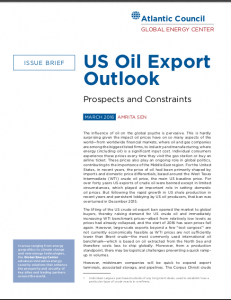Full Title: US Oil Export Outlook: Prospects and Constraints
Author(s): Amrita Sen
Publisher(s): The Atlantic Council
Publication Date: March 1, 2016
Full Text: Download Resource
Description (excerpt):
The influence of oil on the global psyche is pervasive. This is hardly surprising given the impact oil prices have on so many aspects of the world—from worldwide financial markets, where oil and gas companies are among the biggest listed firms, to industry and manufacturing, where energy (including oil) is a significant input cost. Individual consumers experience these prices every time they visit the gas station or buy an airline ticket. These prices also play an ongoing role in global politics, contributing to the importance of the Middle East region. For the United States, in recent years, the price of oil had been primarily shaped by imports and domestic price differentials, based around the West Texas Intermediate (WTI) crude oil price, the main US baseline price. For over forty years US exports of crude oil were banned except in limited circumstances, which played an important role in setting domestic oil prices. But following the rapid growth in US shale production in recent years and persistent lobbying by US oil producers, that ban was overturned in December 2015.
The lifting of the US crude oil export ban opened the market to global buyers, thereby raising demand for US crude oil and immediately increasing WTI benchmark prices—albeit from relatively low levels as prices had already collapsed, and the start of 2016 has seen prices fall again. However, large-scale exports beyond a few “test cargoes”1 are not currently economically feasible as WTI prices are not sufficiently lower than Brent crude—the most commonly used international oil benchmark—which is based on oil extracted from the North Sea and therefore costs less to ship globally. Moreover, from a production standpoint, there may be logistical challenges preventing a quick ramp- up in volumes.
